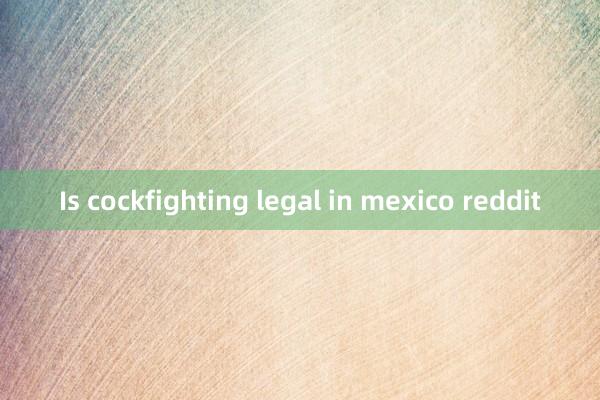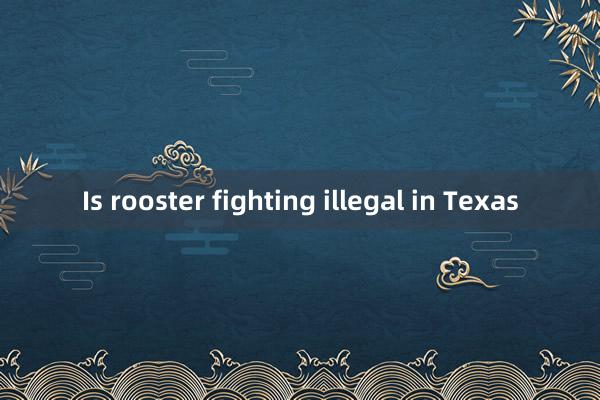Is cockfighting legal in the philippines 2020

Is Cockfighting Legal in the Philippines in 2020?
Cockfighting, locally known as "sabong," has been deeply embedded in Filipino culture for centuries. It’s more than just a form of entertainment; it's a tradition passed down through generations, with strong cultural and economic significance. However, the legality of cockfighting in the Philippines, especially in 2020, depends on several factors, including location, type of event, and government regulations.
Traditional Cockfighting: A Cultural Staple
In the Philippines, cockfighting is an ancient sport that has been practiced for hundreds of years. It dates back to the pre-colonial era when tribes would hold cockfights during religious and social celebrations. The sport, typically held in licensed cockpits (arenas), pits two roosters against each other in a duel, with sharp blades attached to their legs. Enthusiasts place bets, making it not only a form of entertainment but also a gambling activity. For many, especially in rural areas, cockfighting has also become a livelihood, where breeders raise and train gamecocks for competitions.
Legal Status of Cockfighting in 2020
In 2020, traditional cockfighting in the Philippines remained legal under certain conditions. The sport is regulated by the Cockfighting Law of 1974, also known as Presidential Decree No. 449. According to this law, cockfighting is permitted only in licensed cockpits, and fights can take place on Sundays, legal holidays, go88 tài xỉu and during local fiestas. Special permits are required for derbies, phim rule 34 which are large-scale cockfighting events involving multiple fights and substantial prize money.
However,chich69 the COVID-19 pandemic, which swept across the globe in 2020, significantly affected many aspects of life in the Philippines, including cockfighting. The Philippine government, in response to the pandemic, imposed lockdowns and strict quarantine measures, including a ban on mass gatherings. This led to the suspension of cockfighting events nationwide, as they typically attract large crowds, raising concerns about the potential spread of the virus.
By March 2020, as part of the Enhanced Community Quarantine (ECQ) in Luzon and other regions, cockpits were ordered to shut down. This temporary ban on cockfighting was a major blow to those involved in the industry, from breeders and bettors to cockpit owners and workers. The closure of cockpits lasted for several months, with authorities enforcing health and safety protocols to mitigate the spread of COVID-19.
Online Sabong: A Growing Phenomenon
While traditional cockfighting was largely halted due to the pandemic, 2020 saw the rise of "online sabong," or online cockfighting. Unlike physical cockpits, online sabong allows people to place bets and watch cockfights virtually, from the safety of their homes. Several licensed operators began offering online cockfighting platforms, which were especially popular during the lockdown.
go88 tài xỉu vipAlthough online sabong provided an alternative for fans and bettors, it also raised legal and regulatory questions. Some online sabong platforms operated under legitimate licenses, while others did not, causing concern over illegal gambling and a lack of oversight. The rise of online cockfighting also highlighted issues around addiction and financial losses, as access to the sport became easier and more widespread.
The Philippine Amusement and Gaming Corporation (PAGCOR), the government agency responsible for regulating gambling in the country, began taking steps to regulate and monitor online sabong. However, the legal framework surrounding online cockfighting was still evolving in 2020, leaving room for legal ambiguities.
Ethical Concerns and Opposition
Despite its cultural significance, cockfighting has faced criticism from animal rights advocates, who argue that the sport is cruel and inhumane. The practice of arming roosters with sharp blades and forcing them to fight to the death raises ethical questions about animal welfare. Organizations such as the Philippine Animal Welfare Society (PAWS) have long called for the ban of cockfighting, citing the suffering endured by the animals.
In 2020, these concerns gained more traction as public awareness of animal rights grew globally. However, in the Philippines, where cockfighting remains deeply rooted in the culture and economy, any efforts to ban the sport outright have faced strong opposition from enthusiasts and those whose livelihoods depend on the industry.
Conclusion
In 2020, cockfighting in the Philippines was still legal but heavily regulated. Traditional cockfighting remained subject to national and local laws, with licenses and permits required for derbies and cockpit operations. The COVID-19 pandemic led to the temporary suspension of physical cockfights, but online sabong quickly gained popularity, sparking debates around legality and ethics.
While cockfighting is an integral part of Filipino tradition, the sport faces increasing scrutiny from both legal authorities and animal welfare groups. As of 2020, the future of cockfighting in the Philippines remained uncertain, with shifting regulations, ethical concerns, and the ongoing impact of the pandemic shaping its trajectory.
Jili games online real moneywww.sgshand.com






